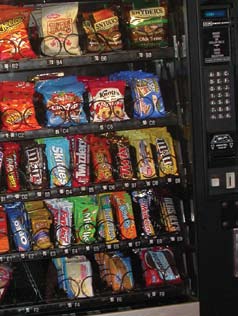 For college students craving a caffeine or sugar boost, vending machines are a godsend. But during down times, after the building lights have been turned off and the doors locked, these machines are reduced to useless energy suckers— unless they’re equipped with “vending misers.”
For college students craving a caffeine or sugar boost, vending machines are a godsend. But during down times, after the building lights have been turned off and the doors locked, these machines are reduced to useless energy suckers— unless they’re equipped with “vending misers.”
These easily installed devices act as an “off” switch during low-usage periods. In academic buildings, that means electricity to vending machines is automatically extinguished during weekends and overnight.
To the student group Engineers for a Sustainable World, installing the devices throughout the Homewood campus was a no brainer. Having done their research, the group knew that the up-front cost of $5,000 would soon pay for itself, and then some. Their prediction proved accurate: In less than two years, the energy savings resulting from the vending misers equaled their cost. Now, they’re saving the university between $2,000 and $3,000 a year in energy costs.
The vending misers came on the heels of another impressive campus sustainability project that, since its installation in 2005, has saved the Homewood campus hundreds of thousands of gallons of water annually. Initiated by the university’s grounds crew, this “smart” sprinkler system possesses multiple sensors that control metered water use depending on temperature, rainfall, and need.
Successful green projects like these, which conserve resources and funds, serve as a prototype for a new and uniquely Hopkins way of funding sustainability projects. Last fall, the administrative members of the Sustainable Hopkins Infrastructure Program (SHIP) approved the following funding criterion for campus-wide sustainability projects: The university’s financial investment in them must be returned within seven years.
“If a project is going to pay for itself over a period of seven years or less, we’ll figure out where we’re going to get that funding,” says James Aumiller, associate dean for finance and administration for the Whiting School of Engineering and a SHIP administrator. He adds, “It is not our intent to restrict a project to a dollar amount, but these requests do need to be reviewed along with other budget requests.”
Driven by the administration’s nod of approval and a passion for making their surroundings greener and leaner, Hopkins’ engineering students are emerging as leaders in campuswide sustainability initiatives.
Environmentally conscious students needn’t wait for seniority before reducing Hopkins’ carbon footprint. They can become ECO-Reps as freshmen. Each year, this freshman-only internship program admits approximately 10 students, each of whom exhibits a strong desire to increase environmental awareness and sustainable actions on campus.
“It’s really nice to be in a place with other people who really care about the environment,” says Rebecca Phillips ’12, an environmental engineering major. She and her fellow ECO-Rep completed a stint policing the trashcans of Homewood’s dining halls, making firm but polite requests for students to separate their trash into recyclable categories.




